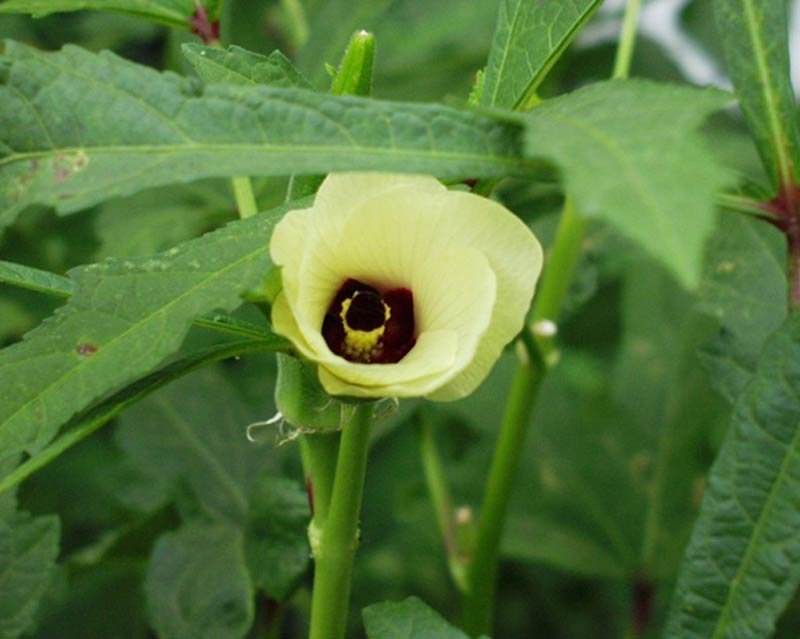
Botanical Name: Abelmoschus Moschatus
Family Name: Malvaceae
Kingdom: Plantae
Division: Magnoliophyta
Class: Magnoliopsida
Order: Malvales
Family: Malvaceae
Genus: Abelmoschus
Species: A. moschatus
Popular Names: Ambrette Seeds, Hibiscus Abelmoschus, Musk Mallow, Musk Okra, Ornamental Okra, Yorka Okra, Galu Gasturi, Bamia Moschata
Parts Used: Seeds, Seeds Oil
Habitat: Common in distributed areas and wastelands
Description
Annual hibiscus is an erect, annual or biennial, hirsute shrub. The soft, herbaceous plant trails to 2 metres in diameter, with soft hairy stems. The lower leaves are ovate and acute, while the upper leaves are palmately 3 to 7 lobed. The bright yellow and large flowers are usually solitary and auxiliary. The capsules are ovate, acute and hispid. The seeds are sub-reniform, black and musk-scented. Due to this strong musk aroma, annual hibiscus seeds are known as grani moschi. In India, the plant is grown widely over the Deccan regions, the hilly regions of Karnataka and at the foothills of the Himalayas. The plant is known as latakasturi, gandapura and kasturilatika in Sanskrit and kasturidana and muskadfana in Hindi.
Plant Chemicals
(+)- macrocyclic musks, 5(Z)-tetradecen-14-oide, 7(Z)-hexadecen-16-olide, linoleic acid, a-cephalin, phosphatidylserine, plasmalogen, phosphati-dylcholine plasmalogen, ketone, ambrettelide, a lactone of ambrettolic acid, trans-2-trans-6-farnesyl acetate, ambrettolide, cis-2-cis-6-farnesyl acetate, cis-2-trans-6-farnesyl acetate, ethyl hexadecanate, ethyl laurate, trans-2-trans-6-farnesol.
Uses and Benefits of Annual Hibiscus
- Annual hibiscus is used as a stimulant and anti-spasmodic in curing snakebites, stomach and intestinal disorders.
- It helps treat ailments such as cramps, loss of appetite, headaches, stomach cancer, hysteria, gonorrhea and respiratory disorders.
- Annual hibiscus forms an ingredient in vermouths, bitters and other food products.
- The herb is used in relieving the spasms of the digestive tract, poor circulation and aching joints.
- It is used in the manufacture of cosmetics like perfumes, soaps, detergents, creams and lotions.
- Annual hibiscus is considered as an insecticide as well.
- The herb is used by the Arabs for flavouring coffee.
- Its seeds are crushed and steam distilled to produce a volatile oil called musk seed oil or ambrette seed oil.
- The seeds are known to be anti-septic, cooling, tonic, carminative and aphrodisiac.
- The leaves and roots of annual hibiscus are helpful in curing gonorrhoea and venereal diseases.
- Its seeds are used as an inhalation, when suffering from hoarseness and dryness of throat.
- The unripe pods, leaves and new shoots of the herb are consumed as vegetables.
- The root mucilage of the plant provides sizing for paper. On the other hand, the flowers are sometimes used to flavour tobacco.
- Annual hibiscus is also used in making traditional herbal liquor, called Benedictine.

